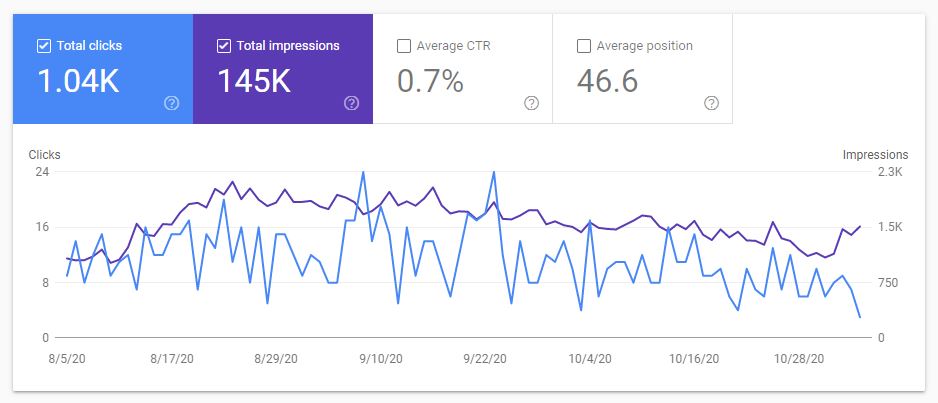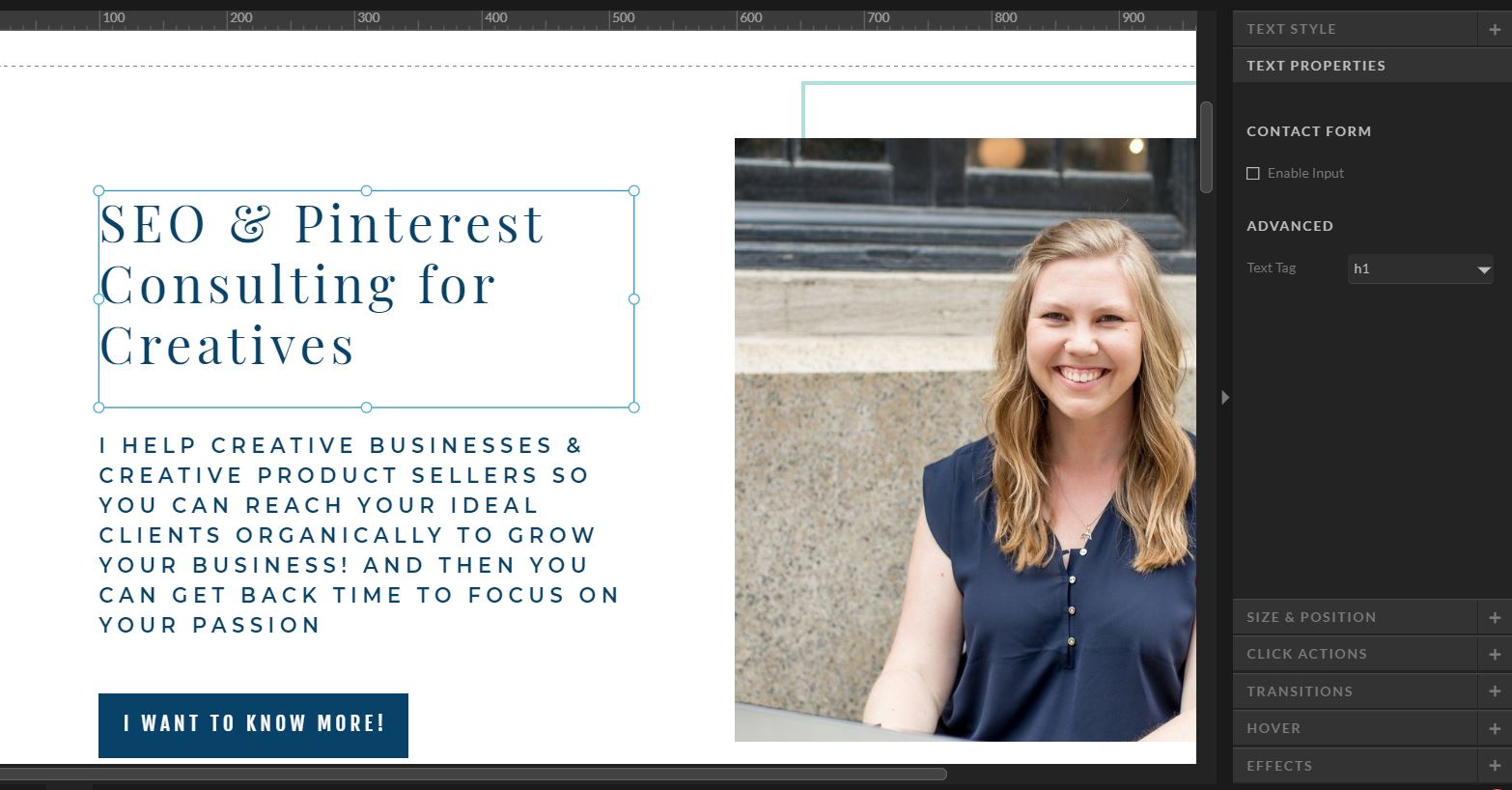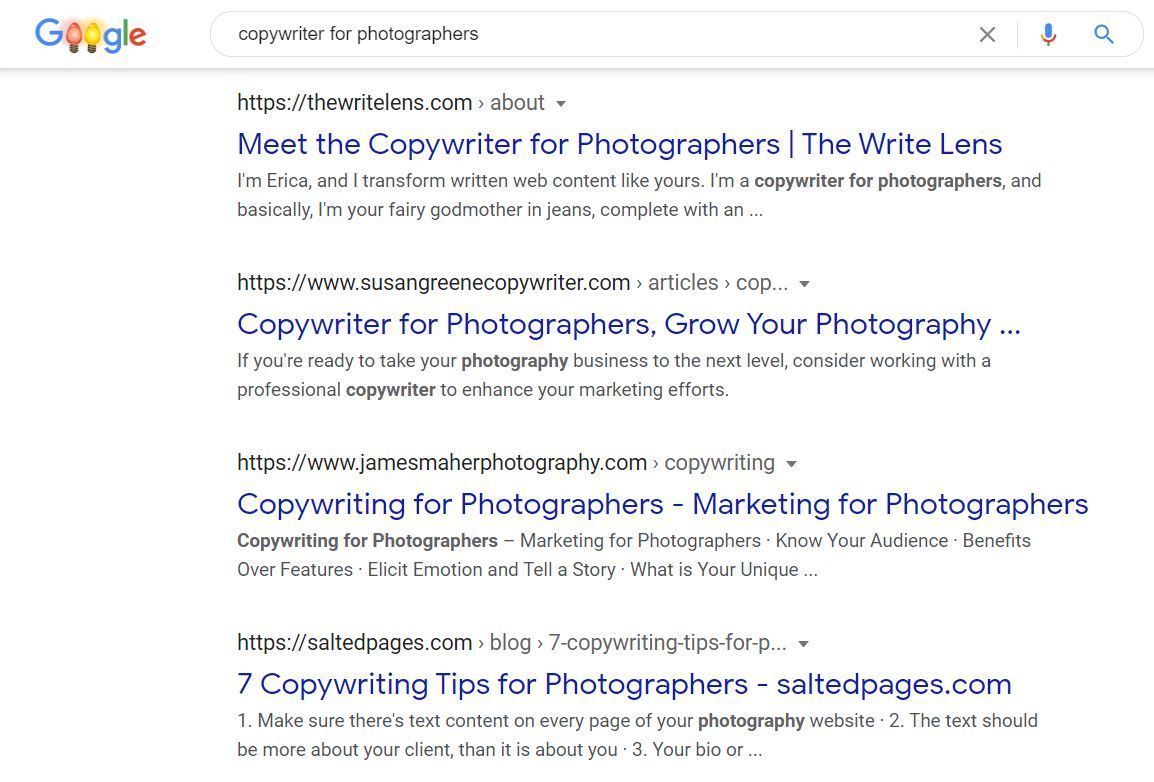If you’ve heard anything about SEO before, you’ve likely heard the word “keywords” tossed around. Finding the right keywords to target is one of the first steps in optimizing your website to rank higher on Google, but you also have to make sure you actually USE the keywords you found. I can’t tell you how many websites I’ve audited or optimized where the business owner tells me they’re targeting a keyword like “wedding photographer” but “photographer” is nowhere on their Home page at all!
So if you know what keywords are, let’s get into the next step and go over how to use keywords on your website so you can actually start ranking for them.
What Are Keywords?
In case you’re not too sure what keywords are, let’s cover some basic info before we get into how to use keywords (and if you want more of a deep dive, I have a whole blog post on Keywords 101).
Keywords are the base of SEO to help Google better understand your content and what it should rank for. Basically, keywords—also known as search queries—are just words or phrases that people enter into search engines when they’re searching for information.
And then when you’re creating content for your website, you use keywords to signal to Google what your pages and posts are about, basically to tell Google what you should rank for. For business owners, using the right keywords helps you reach your ideal clients by matching your content with their search query.
Do Keyword Research
To find the right keywords to target (ones with a good amount of monthly searches and that aren’t too competitive), you need to do keyword research, and yes, I have a whole blog post on how to do keyword research for you 😉 But here are some quick keyword research tips to get you started!
Find Relevant Keywords
Use tools like Google Keyword Planner, Keysearch (my personal favorite), or Ubersuggest to find keywords that align with your services and resonate with your ideal clients. Look for keywords with a good monthly search volume and low to moderate competition.
Analyze Competitor Keywords
You can also use tools to see which keywords your competitors are ranking for. I don’t recommend just completely copying their strategy, but this can provide insights into potential opportunities and gaps in your own strategy. Tools like SEMrush or Ahrefs can help you analyze competitor keywords and identify new targets for your content.
Set up Google Search Console
If you want to see what keywords you’re already ranking for and track your progress as you make changes, make sure you have Google Search Console set up! It’s a totally free tool that has lots of valuable information like what keywords you’re ranking for, what your average rankings are, and how much traffic your website is getting for those keywords.
How to Use Keywords on Your Website
So after you find some keywords you want to target, you need to make sure you actually use them. Here are my top tips!
Target 1-2 Keywords Per Page
I’ve seen SEO agencies give clients a list of 50 keywords to use on a single page, and that’s just excessive. I don’t even know how you could naturally incorporate 50 similar keywords within a few hundred words AND use them enough times to have a good opportunity to actually rank for them. And don’t forget that the purpose of your site is to convert visitors to clients and customers, so writing like a robot just to fit in 50 keywords isn’t going to help your business in the long run.
So you don’t need to go crazy and find every single keyword you could possibly target, just focus on finding 1-2 of the best keywords per page.
You can also incorporate keyword variations so you’re not repeating the same exact phrase over and over. So if you’re targeting “business coach in New York,” variations could include “New York business coach” or “executive coach NYC.”
Integrate Keywords Naturally
Like I said before, don’t forget that your website copy and content are for potential clients, so don’t keyword stuff (which means just using the keyword as many times as possible and sounding spammy) or write weird sentences just to try to squeeze in your keyword as many times as possible. Aim for a keyword density of one to five percent of your total copy. This means your keywords should appear naturally within your content, without sounding forced or awkward. Prioritize readability and engagement over keyword stuffing, even if it means you don’t use your keywords quite as many times as you would like to!
Use Keywords in Headings
The next step on how to use keywords on your website is to include your main keyword in the H1 heading of the page, as H1s carry the most weight for text in SEO since it’s telling Google (and visitors) the main topic of the page. But please, use only one H1 per page! You don’t want to confuse Google about the main topic of the page if every heading is an H1. Use subheadings (H2, H3, etc.) for the rest of the headings on a page, and incorporate keywords where relevant. This structure not only helps with SEO but also improves the readability of your content.
Use Keywords Early in Your Content
If it makes sense with your website copy, use your main keyword within the first few sentences of your page (and using it in the H1 does count since that’s usually the first text on a page). The earlier Google sees the keyword, the better it can understand the page’s relevance. If you don’t use your keyword until word #500 on a page, it may not be as clear to Google (or website visitors) what the purpose and topic of a page is.
I see this on a lot of creatives’ websites where they use vague, fluffy language about “capturing beautiful imagery” or they want to “see your love story” and don’t say that they’re a wedding photographer until the bottom of the page. Getting to the point with the keywords related to your services can really help make it clear to Google and potential clients exactly what you do! (And there is definitely a time for the more romantic, fluffy language if that’s your brand, just use it after you get clear on who you are/what you do).
Optimize Your Title Tags and Meta Descriptions
Title tags and meta descriptions are what you see in search results on Google, so they’re important for catching people’s attention and getting them interested in clicking through to your site.
Title tags are the hyperlinked page title you’ll see in search results, and they are a ranking factor so it’s important to use your keyword in the title tag. Keep title tags under 60 characters including spaces, so they don’t get cut off on Google (many website platforms give you way more than 60 characters- I’m looking at you, Squarespace).
Meta descriptions are the short paragraphs of text under the title tag. Keep them under 160 characters including spaces, and use it to give a short, compelling summary of the page to get people wanting to visit your site for more information. Meta descriptions aren’t a ranking factor like title tags, but when you incorporate your keywords, they will show up bold in search results, which can help catch people’s eyes more.
Different website platforms have different names for title tags and meta descriptions, like SEO Title or Page Description, so just check to see what language your website platform uses.
Optimize Your URL Slugs
One optional place to use keywords on your website is in the url slugs. This is more relevant for blog post urls than website page urls, but you can use them for your website pages if it makes sense (mostly for the services pages is what I recommend). The url slug is just the part of a url that comes after your domain, like mywebsite.com/url-slug.
So if you’re a therapist, your services page url could be something like mywebsite.com/therapy-services. If you have multiple service pages, instead of doing something like mywebsite.com/services-1 and mywebsite.com/services-2, you can do mywebsite.com/ptsd-therapy-services and mywebsite.com/anxiety-therapy-services.
I don’t recommend messing with your home page url because that should just be your domain. I also don’t recommend going through and changing all of your page urls because it could get messy and create a bunch of broken links, which can hurt your site’s SEO. But if your urls currently look like mywebsite.com/2257 or mywebsite.com/copy-of-services, it can help to create new url slugs that look more professional and incorporate your keywords where you can. Just make sure you set up link redirects so you don’t create 404 errors!
So I hope these tips taught you some best practices on how to use keywords on your website! By finding and using your target keywords, you’ll have a better chance of ranking higher on Google and reaching more of your ideal clients. And if you need help with keyword research or optimizing your site, check out my SEO services and see how I can help you!





